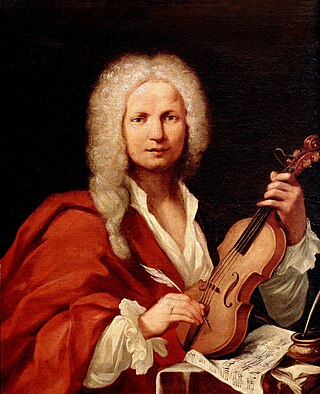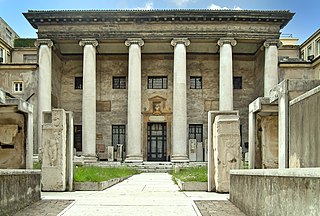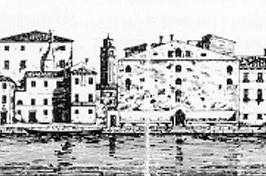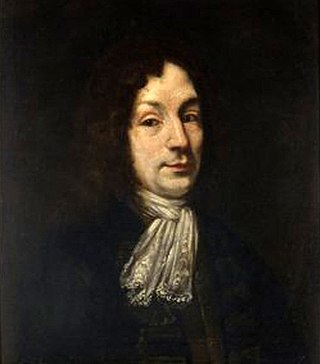
Antonio Lucio Vivaldi was an Italian composer, virtuoso violinist and impresario of Baroque music. Along with Johann Sebastian Bach and George Frideric Handel, Vivaldi ranks amongst the greatest Baroque composers and his influence during his lifetime was widespread across Europe, giving origin to many imitators and admirers. He pioneered many developments in orchestration, violin technique and programmatic music. He consolidated the emerging concerto form into a widely accepted and followed idiom.

Benedetto Giacomo Marcello was an Italian composer, writer, advocate, magistrate, and teacher.

Francesco Scipione Maffei was an Italian writer and art critic, author of many articles and plays. An antiquarian with a humanist education whose publications on Etruscan antiquities stand as incunables of Etruscology, he engaged in running skirmishes in print with his rival in the field of antiquities, Antonio Francesco Gori.
This is a list of notable events in music that took place in the year 1732.
Lorenzo Regazzo, is an opera singer. His voice can be categorised as bass, bass-baritone or basso cantante. He is especially well known for interpreting Baroque, Classical, and bel canto repertoire. Among the qualities frequently noted by the critical press are his virtuosic coloratura technique, sumptuous tone, and vivid stage presence.

The Teatro Filarmonico is the main opera theater in Verona, Italy, and is one of the leading opera houses in Europe. The Teatro Filarmonico is property of the Accademia Filarmonica di Verona. Having been built in 1716, and later rebuilt after a fire of January 21, 1749, and again after the allied bombing of February 23, 1945.

Jean-Christophe Spinosi is a French conductor and violinist, the founder of French orchestra Ensemble Matheus.

Geminiano Giacomelli was an Italian composer.

La Silvia is an dramma pastorale per musica in three acts by Antonio Vivaldi to an Italian libretto by Enrico Bissari. It was first performed on 28 August 1721 at the Teatro Regio Ducale in Milan on the occasion of the birthday celebrations of the Austrian Empress Elisabeth Christine, wife of Emperor Charles VI of Austria.

Sara Mingardo is an Italian classical contralto who has had an active international career in concerts and operas since the 1980s. Her complete recording of Anna in Hector Berlioz's Les Troyens won a Gramophone Award and both the Grammy Award for Best Opera Recording and the Grammy Award for Best Classical Album in 2002. Some of the other roles she has performed on stage or on disc include Andronico in Tamerlano, Mistress Quickly in Falstaff, Rosina in The Barber of Seville, and the title roles in Carmen, Giulio Cesare, Riccardo Primo, and Rinaldo. She has also recorded several Vivaldi cantatas, Bach cantatas, and such concert works as Mozart's Requiem, Rossini's Stabat Mater, and Vivaldi's Gloria among others.

The Teatro San Angelo or Teatro Sant'Angelo was once a theatre in Venice which ran from 1677 until 1803.
Anna Girò, also known as l'Annina del Prete Rosso, la Nina del Prete Rosso, or l'Annina della Pietà, was the stage name of Anna Maria(?) Maddalena Tessieri, an Italian mezzo-soprano/contralto of the 18th century. She is best remembered for her numerous collaborations with composer Antonio Vivaldi who wrote operatic roles for her. She is the singer who performed the greatest number of Vivaldi's operas, the one who kept them in her repertoire the longest time and who made them known across the largest geographical area.

Luca Antonio Predieri was an Italian composer and violinist. A member of a prominent family of musicians, Predieri was born in Bologna and was active there from 1704. In 1737 he moved to Vienna, eventually becoming Kapellmeister to the imperial Habsburg court in 1741, a post he held for ten years. In 1765 he returned to his native city where he died two years later at the age of 78. A prolific opera composer, he was also known for his sacred music and oratorios. Although his operas were largely forgotten by the end of his own lifetime and most of their scores lost, individual arias as well some of his sacred music are still performed and recorded.
Angelo Ephrikian was an Italian musicologist and violinist of Armenian descent. His daughter, Laura Ephrikian, is an actress.
Luca Canonici is an Italian opera singer who has had an active career singing leading tenor roles both in Europe and his native Italy.

Il GiustinoRV 717 is a 1724 opera by Vivaldi set to a libretto by Nicolò Beregan, originally used for the 1683 opera of the same name by Giovanni Legrenzi, and also later set by Albinoni and Handel. The opera was composed for the 1724 carnival season in Rome and premiered at the Teatro Capranica.

Sebastiano Biancardi, known by the pseudonym Domenico Lalli, was an Italian poet and librettist. Amongst the many libretti he produced, largely for the opera houses of Venice, were those for Vivaldi's Ottone in villa and Alessandro Scarlatti's Tigrane. A member of the Accademia degli Arcadi, he also wrote under his arcadian name "Ortanio". Lalli was born and raised in Naples as the adopted son of Fulvio Caracciolo but fled the city after being implicated in a bank fraud. After two years wandering about Italy in the company of Emanuele d'Astorga, he settled in Venice in 1710 and worked as the "house poet" of the Grimani family's theatres for the rest of his career. In addition to his stage works, Lalli published several volumes of poetry and a collection of biographies of the kings of Naples. He died in Venice at the age of 62.

Maria Caterina Negri was an Italian contralto who created numerous roles in 18th-century operas, including many by George Frideric Handel. She primarily portrayed male characters en travesti or female warriors such as Bradamante. Negri was born in Bologna and made her debut there at the age of 15. Her last known performance was in 1744. The date and place of her death are unknown. In its prime, her voice was known for its agility and wide vocal range.

Semiramide is a dramma per musica in three acts by Antonio Vivaldi composed to a libretto by Francesco Silvani.













